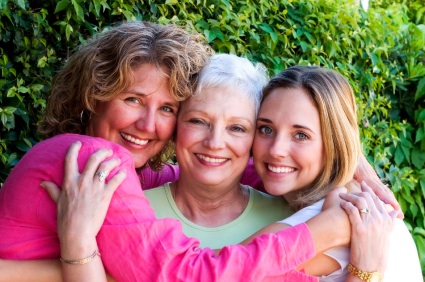
Reaching and maintaining equilibrium is not done by force of heredity; it’s something we cultivate through the way we live. Genetics plays a part, of course, and balance certainly does seem easier for some. But looks can be deceiving; some may actually mask unhealthy habits. Consider the proverbial model who eats nothing but burgers and pizza yet doesn’t gain a ounce. Genetics may be protecting her insides—for now—from this assault (if not from our envious glares.) But, just as likely, such a woman may in fact be less well than one who must pay much more attention to what she consumes, how much she moves, etc. Genetic predisposition to slenderness is not, as I have said, disproportionately distributed among French women. Most who appear to live in healthy balance are actually working at it. But that work has been made infinitely easier by wise cultural conditioning and practice.
Unfortunately for all women—see under “life, unfairness of”—the equilibrium we work to achieve shifts as we age. If we don’t continue paying close attention to our bodies, our healthy balance will be pulled out from under us. But despair not: attention and incremental adjustment throughout life are easier than big corrections following long intervals of imbalance. Alertness and rapid response can allow us to enjoy a long life of pleasures while never getting fat.
Still, it does happen. We can be eating well and staying active, etc. for years, when, bang!: force majeure. This is true for all humans, but especially women, whose weight and silhouette can be radically altered by three major physiological and psychological events, in which hormones run amuck: adolescence, pregnancy and menopause. All three present a serious potential for troublesome weight gain, and it’s better to plan for them, rather than eat first and ask questions later.
Age 17-35
For many, the twenties seem like the time of infinite possibility, although in retrospect, a woman will always idealize her thirties. Late teens and early twenties are inevitably a tough transition, as they were for me. College, starting a career, even a family. This great stress comes just as we have already exhausted everyone’s patience with teenage angst. I’ve met countless women in their twenties suffering weight problems on account of not having yet grown into adult habits of eating, drinking and moving. It’s particularly painful to see them suckered by unsustainable diets—to which faith in technology, common in today’s youth, appears to make them especially vulnerable.
A little fuzzy science is a dangerous thing. They also tend to want results timed to social events, of which there are many for the predominantly single demographic. And so the idea of ten pounds in two weeks is extremely seductive. Making matters worse, most haven’t learned anything about how to cook. If this is you, I recommend the French woman’s full Monty: a month of nutritional inventory, magic leek soup, short- and long-term recasting. Now is the time to get serious about putting away childish things.
The freedom most enjoy during the 17-35 period can also invite seemingly grown-up excesses: rich meals out (for business and adult courtship rituals), and especially excess alcohol consumption among the freshly legal and unsupervised. For this demographic most overeating occurs after 8:00 p.m., when you should be most en garde. It’s important to develop hunger pacifiers for the times leading up to lunch and dinner, and the twilight zone before bed.
Muscle mass and bone density should be at its peak. Ironically though, now is the time when most of us fall into a destructive pattern of sedentary lifestyle, fostered by the fact that more and more jobs require us to sit at a desk all day for the first time in our lives. The habits of movement, the principle of faire cent pas (walk 100 steps) can be a help here, though the girl in us still wants to blast away her sins in stairmaster marathons. Eventually this gets too boring or exhausting, and the roof caves in on her precarious equilibrium. The sooner you learn the French woman’s incremental approach the easier and more pleasurable will be the rest of your life.
Try to transform exercise time into entertainment; look for activities and exertions that amuse you, especially if you can do them with friends. There are a thousand stops on the road from tri-athlete to couch potato. It is an absolute must to start walking at least 30 minutes a day during these years. Swimming and yoga are also wonderful if you have the inclination. But in any case, you must not let muscle tone and flexibility go until the next stage, when they will be much harder to recover. Ditto metabolism, which naturally declines beginning as early as 25!
For pregnant women, fat accumulation is natural and tends to occur mainly in the first months to build the body’s reserves for breast feeding. The risk of post-partum weight problems is much greater if you are slightly overweight before you become pregnant. So before you start managing an equilibrium for two, it’s a good idea to get your own in order. Don’t fall back on the inevitability theory: “What’s the use? In 3 months I’ll be big as a house anyway.”
Breastfeeding is good for the baby, but it’s also good for the mother, putting the fat reserves to their intended use for milk production. A month of breast feeding can do wonders trimming the silhouette especially below the waist, reducing what we call culottes de cheva (“riding breeches,” what you call saddle bags); losing those pregnancy thighs is a true obsession with French women. The exertions of motherhood can be a great help if you manage the stress sensibly
